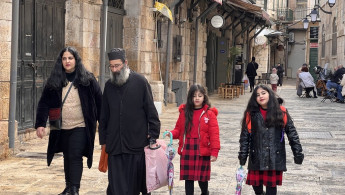'A day usually happiest, now marked by grief': Bethlehem Christians mourn for Gaza on Christmas Day
The festivities which usually happen at Christmas time are noticeably absent this year in Bethlehem as people mourn the deaths of over 20,500 Palestinians killed by Israeli's indiscriminate attacks in Gaza and hundreds more in the West Bank.
The streets of Bethlehem, typically adorned with Christmas decorations, are starkly bare this year. A large decorated tree that usually stands in Manger Square near the Church of the Nativity, symbolizing hope and renewal, is notably absent.
Special prayers, family gatherings, gift exchanges, and visits by Santa Claus, along with other signs of joy, have been curtailed out of respect for those lost in the recent war.
"We cannot celebrate while our people in Gaza are in the shadow of genocide and the world is silent," Raffi Ghattas, a 26-year-old Palestinian Christian from occupied East Jerusalem, told The New Arab.
Christians are part of the Palestinian people and the Holy Book tells us 'Rejoice with those who rejoice; mourn with those who mourn' and therefore we today as Christians we remember our people in Gaza who can't find a safe place for themselves.
Munther Isaac, the pastor of the Christmas Evangelical Lutheran Church in Bethlehem said in a sermon on Christmas Eve however that Palestinians will heal from the deep suffering Israel has inflicted on them, while saying he "felt sorry" for those supporting it in its attacks on Gaza.
"We, the Palestinians, will recover... I feel sorry for those who are complicit. Will you ever recover from this?"
"We, the Palestinians, will recover... I feel sorry for those who are complicit. Will you ever recover from this?"
— Lowkey (@Lowkey0nline) December 24, 2023
Munther Isaac, pastor of Christmas Evangelical Lutheran Church in Bethlehem.pic.twitter.com/TREHFHjmTE
"The atmosphere in Bethlehem was very sombre yesterday, a day that is usually the happiest of the year, attracting tens of thousands of local and international celebrants," Sami El Yousef, the chief of The Latin Patriarchate of Jerusalem, told The New Arab.
For Christians following the Western calendar, the customary welcoming of the procession of the Latin Patriarch of Jerusalem, Pierbattista Pizzaballa, into Bethlehem was also noticeably missing.
Instead, the primary event in Bethlehem this year was the display of a symbolic cave set up in front of the Church of the Nativity. It featured a child model representing Jesus, surrounded by rubble and stones, symbolizing the current destruction in Gaza and drawing parallels to Jesus's birth during a time of flight and displacement, akin to the current plight of Palestinians in Gaza.
Christmas is canceled in Bethlehem due to the ongoing genocide in Gaza. pic.twitter.com/npLjdrb1ni
— Abby Martin (@AbbyMartin) December 24, 2023
“With the cancellation of the usual festivities and a focus solely on religious ceremonies, the traditional entrance of the Patriarch was notably subdued,” El Yousef explained.
The customary scout bands and music were replaced with a limited number of scouts carrying banners in support of Gaza.
The traditional Christmas Eve procession of the Catholic Patriarch of Jerusalem to Bethlehem. Usually celebratory and accompanied by Christmas carols. This year it was silent and local Palestinian Christians carried banners supporting Gaza and calling for ceasefire pic.twitter.com/v8B1FuFDbB
— Ghanem Nuseibeh (@gnuseibeh) December 24, 2023
Israeli authorities significantly restricted access to Bethlehem by closing the entrances, allowing passage through the checkpoint only for a few hours. “This greatly limited the arrival of people to the city,” El Yousef added.
Before the Israeli bombing of the Saint Porphyrius Orthodox Church compound in Gaza on 10 October, which resulted in 18 deaths and many injuries, churches were regarded as safe refuges for the community.
Currently, all three Christian worship sites in Gaza have been targeted by Israeli attacks. Sami El Yousef described the situation of Gaza's Christian community as "extremely painful." He observed that the community lost 2.5 percent of its population to the war.
Additional reporting by Ibrahim Husseini








 Follow the Middle East's top stories in English at The New Arab on Google News
Follow the Middle East's top stories in English at The New Arab on Google News


